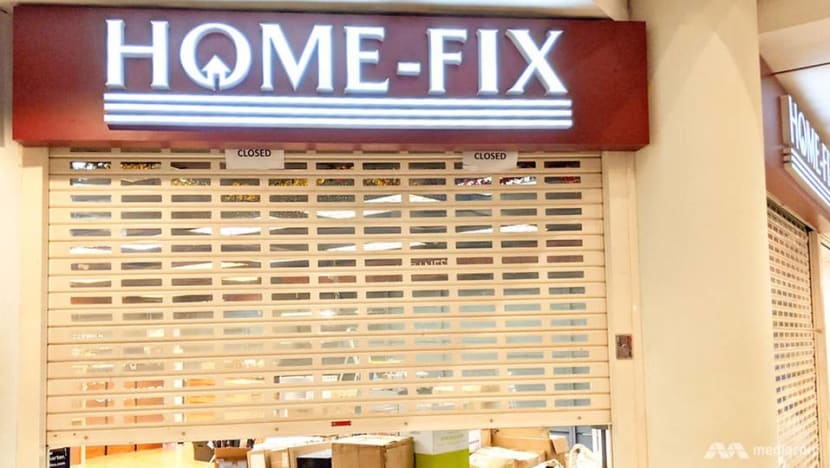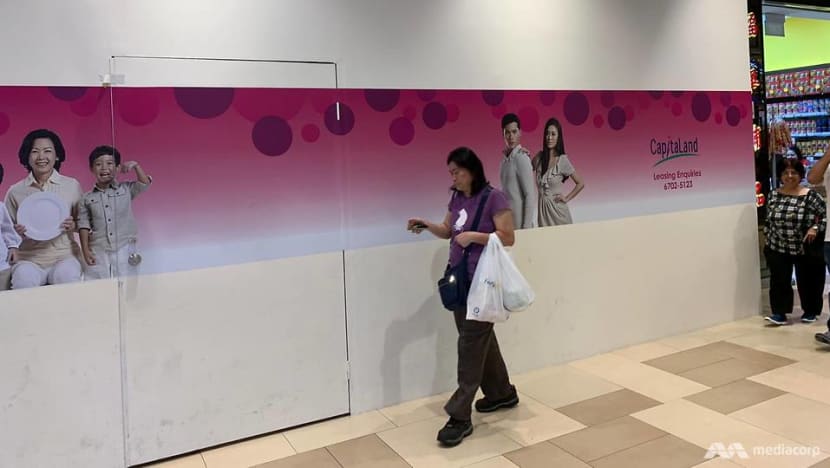Store closures an end of chapter, but Home-Fix to come back in a very different form: Co-founder

Home-Fix outlet at Tanglin Mall. (Photo: TODAY/Janice Lim)
SINGAPORE: Beleaguered family-run hardware firm Home-Fix may have pulled the shutters down at its stores for good after a 26-year run, but its founders are not giving it up without a fight.
The Do-It-Yourself (DIY) chain is in talks with potential investors and is looking to transform itself and come back in a “very different form”, co-founder and managing director Low Cheong Kee told CNA on Thursday (Dec 12).
“We have a game plan in mind. We are garnering support for it,” he told CNA at the Home-Fix building in Tai Seng, where the company's offices, showroom and warehouse are located.
READ: Commentary: Sasa shutters in Singapore – the writing was on the wall
At its peak, Home-Fix had more than 20 stores across Singapore.
On Thursday, however, it closed the shutters at its last remaining store in Tampines One for a final time, becoming the latest casualty in the retail sector in Singapore. Home-Fix's online store is still operational.
Cosmetics retailer Sasa announced last week that it would close all 22 stores in Singapore, while DFS will be closing its duty-free liquor and tobacco stores at Changi Airport after 38 years.
For Mr Low and his brother Low Cheong Yew, who set up Home-Fix together in 1993, the closure of its physical stores does not mean the end.
“Both me and my brother are fighting all the way,” he said.

PLANS TO MAKE HOME-FIX MORE "NIMBLE"
The plan is to make Home-Fix smaller and more nimble, Mr Low said.
Mr Low did not say what form Home-Fix would come back in, but dropped hints that a “robust” enterprise resource planning system Home-Fix invested in will play a big part.
“It's with this core fundamental that we hope to revive Home-Fix and be a bit more nimble,” he said.
Home-Fix previously used the system to optimise manpower in the accounting department, which was overwhelmed with paperwork, including delivery orders, payment orders, and invoices, he said.
Touching on the topic of Home-Fix being under interim judicial management, Mr Low said that the writing had been on the wall for some time.
Home-Fix began to see a decline in business three to four years ago, with the growth of online marketplaces.
“They come with a huge war chest to acquire customers and they are willing to sell things at a loss to do that,” he said.
Manufacturers selling directly to consumers and millennials veering away from DIY also took their toll on Home-Fix, said Mr Low.
Home-Fix tried to find solutions by expanding into services, experiences and online sales, and for that, was held up as an example by Prime Minister Lee Hsien Loong in his May Day Rally last year.
However, that wasn't enough.
“I think we were on that right track. It's just that we couldn’t do it as fast as we wanted to,” he said.
In its heyday, Home-Fix's turnover was S$43 million, said Mr Low.
While he declined to disclose the amount owed to creditors, Mr Low said the reported figure of about S$20 million was “off”.
“The stress of paying rental, paying salary, paying suppliers was all piling up. This stress of maintaining these expenses with sales coming down has been going on for more than a year,” said Mr Low.
Judicial management is a form of debt restructuring where an independent judicial manager is appointed to manage the affairs, business and property of a company under financial distress. It also shields companies temporarily from legal proceedings by third parties, giving it a chance to be nursed back to health.
“In the next six months, before we undergo a review, it's critical that I work on getting support for the transformation,” he said.
READ: Sasa shutters, there were others: 5 popular names that left Singapore malls
A ROLLER COASTER RIDE, LETTING GO OF "FAMILY"
As Home-Fix's finances turned for the worse, difficult decisions had to be made.
Describing it as a roller coaster ride, Mr Low said that the company tried to hold on to their employees and stores that were performing "borderline" for as long as possible.
But the interim judicial manager advised it to terminate the staff.
“We had to let go of a lot of people to cut down the burn rate. We had to close shops that we had for many years,” he said.
“I have people who have been with us for many years. I saw them grow up, I saw them get married. They are like family,” Mr Low said.
The close relationship Mr Low has with his employees was apparent when one of his branch managers, who had been with the firm for 11 years, dropped by during the interview for a final farewell.
During their exchange, Mr Low checked in on whether he had found another job, and promised to visit him. Their eyes filled up as they shared a hug.
In the short term, Mr Low said he hopes to use the proceeds from an upcoming four-day warehouse sale at its Tai Seng showroom to pay his employees.
Items that are not sold will be moved to an 18,000 sq ft storage space in Bedok loaned by a friend temporarily, he said.
Despite the turmoil, Mr Low said he is grateful for the encouragement and support he has received.
In a townhall meeting with creditors two days ago, people pledged to support the firm in its transformation, he said.
“It's sad that this chapter has to end but I think in life there a lot of things that need to end and need to be reborn and restarted,” he said.
Additional Reporting by Aqil Haziq Mahmud















